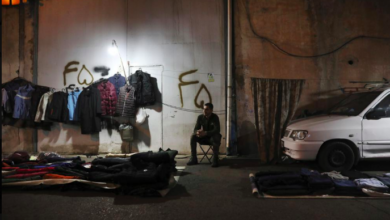A long-standing law which seeks to ensure employment for Egypt’s disabled people may finally be implemented.
In 1975, a law was passed requiring public and private employers with more than 50 employees to reserve five percent of jobs for people with disabilities. But the law has never been implemented, leaving many people with disabilities marginalized and unemployed.
Finally, it seems as though the government has begun to enforce the quota this month based on orders from President Mohamed Morsy.
On Monday, Beheira Governor Mokhtar al-Hamalawy announced that there are 836 job openings for people with disabilities this month, for which candidates have 30 days to apply, according to state-run news agency MENA.
He added that a memo was distributed to all public companies and employers to implement the five percent quota when any job openings occur.
“At the Electricity Ministry where I work, they are starting to abide by the five percent job quota for disabled people, saying it’s based on Morsy’s orders,” Fatma Seif, head of human resources at the Ministry of Electricity, who suffers from infantile paralysis, tells Egypt Independent.
Abiding by the quota was one of the many promises Morsy made during his first meeting with people with disabilities on 22 October.
The assurances Morsy made also included the re-establishment of the National Council on Disability so that people with disabilities make up more than half of the council. The 28-member council includes nine ministers and 13 people with disabilities, according to the council’s Secretary General Hala Abdel Khaleq.
The decree to establish the council issued by former Prime Minister Kamal al-Ganzouri in April stipulated that it include only four people with disabilities.
But Abdel Khaleq and other leading members of the council worked around the decree and included people with disabilities among the public figures and representatives of associations for people with disabilities.
Disabled protesters have complained that the council is dominated by government officials and associations for the disabled.
“The council should monitor these ministers and associations for the disabled and make sure they serve our best interest, not be dominated by them,” Seif says.
Osama Tayea, consultant for the National Council on Disability and one of the protesters, complained that the role of the current council is advisory.
“The current council has no real authority — it merely advises the Cabinet — but we want the council to have the power to issue decrees and implement them,” he says.
However, Morsy made no comment on this demand, according to Tayea.
“We’ll just have to wait and see what Morsy’s upcoming decree regarding people with disabilities will include,” he says.
Morsy also vowed to allocate LE1 million to fund the National Council on Disabilities, which faces difficulties performing its duties because of budget constraints.
“The council hasn’t received the increase in budget yet and we’re still looking for a headquarters,” Abdel Khaleq says.
Among the demands of people with disabilities are a reasonable monthly pension of LE 1,500, health insurance and the alleviation of taxes on cars they purchase.
“Any person with disabilities who’s married and has children gets a monthly pension of LE85…that’s not even enough to pay rent or buy food for a month,” Seif says.
One of the top demands is the construction of ramps leading to metro stations and ministry headquarters.
Most Egyptians struggle with the congested traffic, jagged streets and poor public transportation, an environment that is more difficult for people with disabilities.
The president said he’d look into these demands, without making any promises that they would be implemented.
However, Seif and Tayea hope that when a National Council on Disabilities that truly represents them and understands their needs is established, it would see that their demands are heeded.
On 10 October, dozens of Egyptians with disabilities held an open sit-in on Merghany Street in front of the presidential palace that lasted for around 12 days before meeting with President Mohamed Morsy.
On 14 October, the disabled protesters were attacked by security forces, causing the dismay and outrage of many political forces, who condemned the act. Four protesters were injured, including one whose arm was broken during the clashes, according to Seif’s testimony of how events escalated that day.
She says that security forces first cordoned off the disabled protesters and pushed them back. The demonstrators attempted to flee the cordon. Security forces then chased them and beat them with batons, trying to force them to leave the scene.
Seif denied security officials’ claims that the disabled demonstrators attempted to block the road.
“Most of us are in wheel chairs and crutches, how can we block a road like Merghany which is flooded with speeding cars?” she asks.
The perseverance of the disabled protesters and their refusal to leave the scene despite the attack landed them a meeting with the president a week later. Morsy officially apologized for the incident and vowed to start an investigation to hold those responsible accountable for their crime.
There are no reliable official figures on the number of disabled people in Egypt, but Abdel Khaleq estimates that there are around 12 million disabled people, equivalent to around 15 percent of Egypt’s population. The activists among them are still waiting for Morsy to follow through with his promises to guarantee them a “decent life.”
“We suspended our open sit-in for two months to give the president the opportunity to achieve his promises to us; if he doesn’t, we will take to the streets again,” Seif says.




